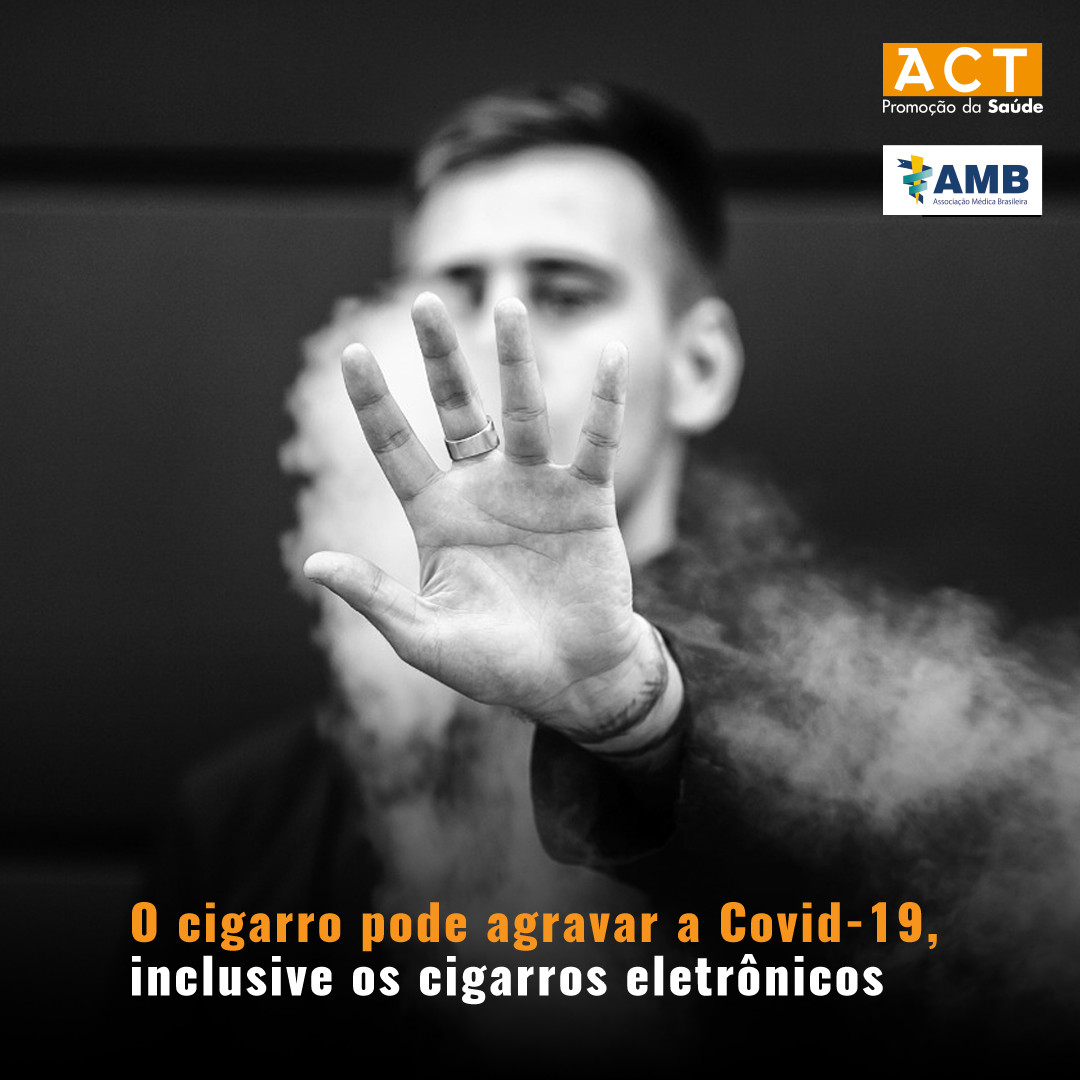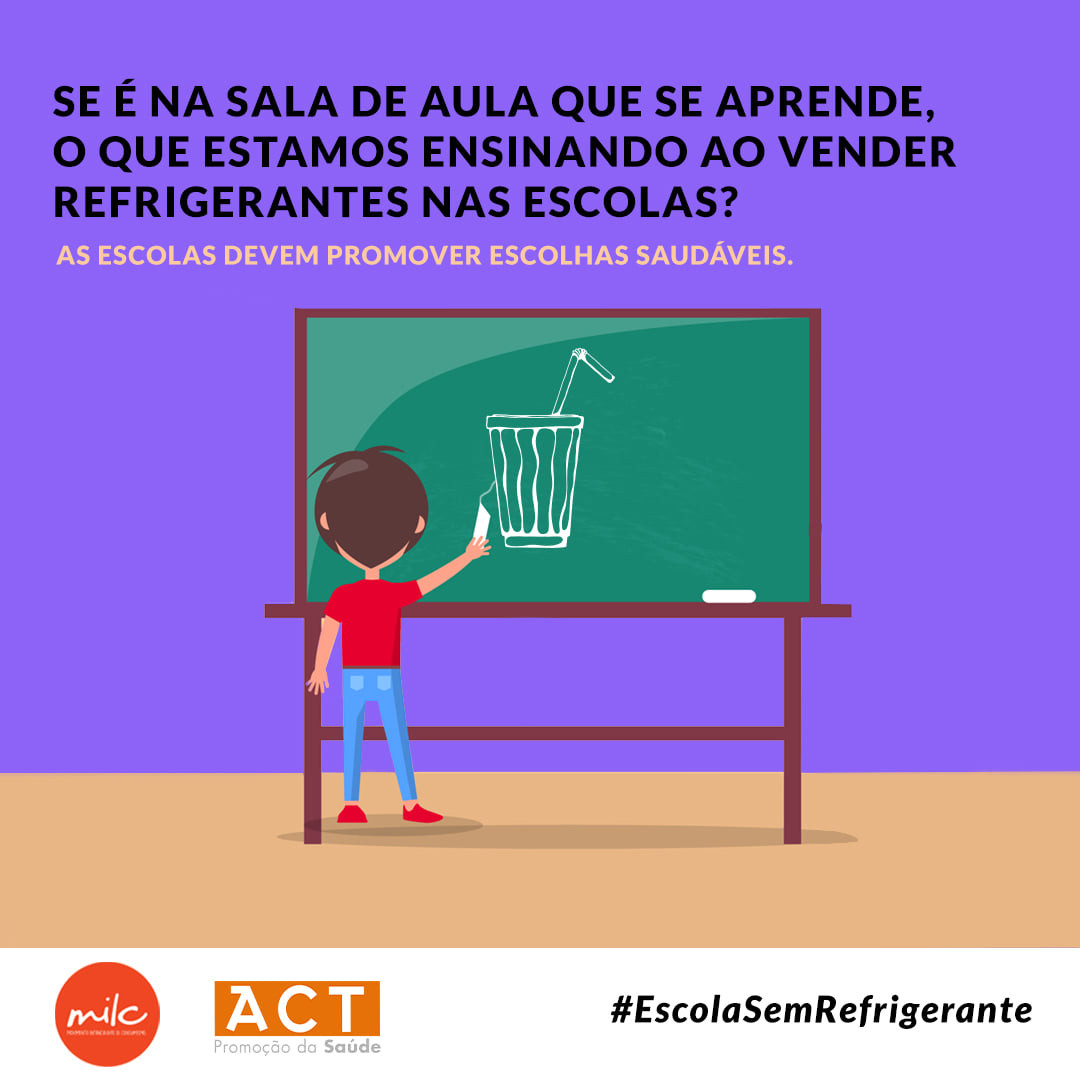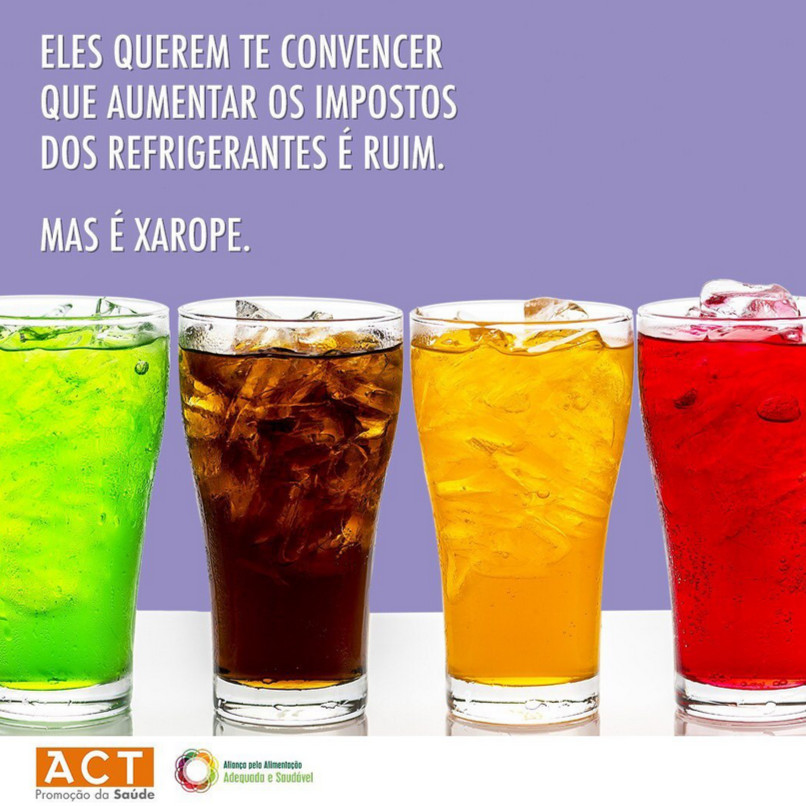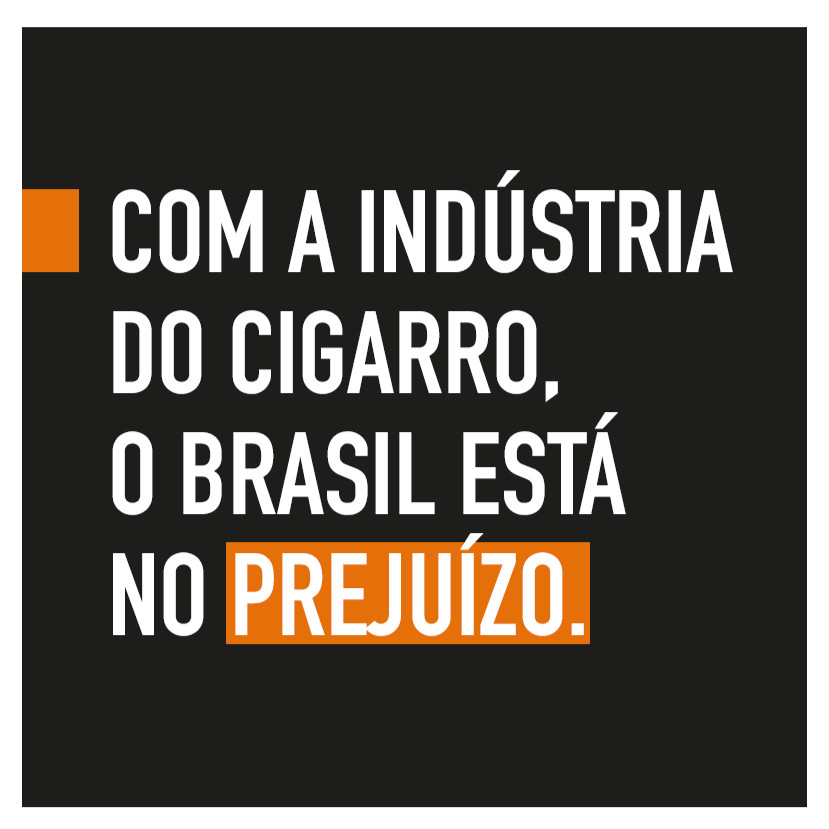Monitoring Bulletin - September 2020
08.09.20ACT Promoção da Saúde
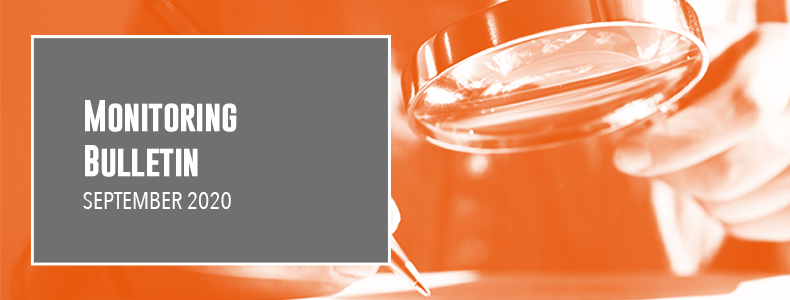
Editorial
Economists and financial analysts have been presenting a variety of scenarios for the post-pandemic future and we frequently hear words like recession, depression and stagnation. The fact is that the pandemic brought on by the coronavirus has disrupted global economies in such a way that companies need to think about how to recover part of their investments and start to grow again, without affecting good corporate image.
Companies from the tobacco, ultra-processed foods and alcoholic beverage sectors, among others, have been running their usual marketing campaigns and trying to sell more products, but in a not-so-obvious way in order to win over the consumers, posing as the players that collaborated during the epidemic and contributed towards economic recovery. Thus, as upstanding citizens, they start to be recognized for bearing their share of the sacrifice.
One coalition that has been drawing our attention during this period is the Movimento Nós (“We” Movement), formed by food and beverage sector giants, and is well deciphered in the text written by Laura Cury. With this partnership, the companies are jointly trying to recover losses caused by the economic downturn promoting campaigns to help businesses to follow the rules set out in the so called new normal. The act of joining forces in order to move forward on common agendas has long been used by the tobacco industry: each company establishes their position and achieves the largest market share, but they flock together when there is a need to block some regulation which may affect sales. The author also approaches the The alcohol industry’s commercial and political activities in Latin America and the Caribbean, to sell more products, even in epidemic times, about to be launched.
With regard to the tobacco industry, Mariana Pinho and Maria Paula Riva engage in talking about these companies’ strategies to increase their profits above all else, becoming associated with socially acceptable lifestyles, to characters and to celebrities. The main thing, as we see it, is to afford credibility and clean up the image of a business which kills half of its consumers, if instructions are followed correctly.
Camila Maranha spoke to professor Maria Cristina Passos from the Social and Clinical Nutrition Dept. at Ouro Preto Federal University, who is the current managing director of the International Baby Food Action Network (Ibfan), about a specific issue: breastfeeding. In August, awareness month on the issue, many initiatives to promote infant formulas and milk powders were identified, going against the Brazilian Standards for Sales of Infant and Early Childhood Foods, Baby Bottles, Nipples and Pacifiers (NBCAL)(2), some endorsed by medical societies, which caused outrage by organizations that deal directly with the issue.
Between the 7th and 13th of September the ACT will take part in the global action week led by NCD Alliance on the topic of “Accountability” with governments, corporations and society with regard to their role and impact on the global chronic non-communicable disease pandemic, made worse by the other current pandemic, Covid-19. Paula Johns will be addressing this theme, and illustrates the issue with a number of examples of global businesses who position themselves as a solution to the current crisis. She warns of the risk that a lack of critical thinking could end up distorting the sustainable development objective agenda, and that some segments of the population may be left behind.
Crises, however, bring opportunities, so much so that the Chinese ideogram for both of them are the same. Here in Brazil, we stand before a major possibility to start mitigating our social and economic inequalities with the upcoming tax reforms, currently under discussion in Congress. Our view is that it is necessary to focus on higher taxes on products that are damaging to health and which overburden the Brazilian Single Health System (SUS), such as tobacco, sweet and alcoholic beverages, as well as pesticides. Thus, the price of these products would tend to rise, contributing towards a fall in their consumption, consequently causing fewer people to fall ill. That is what the Technical Paper produced by ACT is about, entitled Por uma reforma tributária a favor da saúde (For tax reforms in favor of health), and we ask you, our reader, to share it among your groups and convey our message.
Enjoy your reading
Anna Monteiro
Communications Director
A meeting of Pandemics
Paula Johns

In addition to the pandemic caused by a highly contagious virus, we have another, silent pandemic, transmitted by non- contagious agents, whose magnitude can no longer be ignored. We are talking about the chronic non-communicable disease (NCD) pandemic. Together, running in parallel and feeding back into themselves, these two epidemics expose tremendous structural flaws in global health governance.
The role of organized civil society is essential within this reflection and the comprehensive debate which must be engaged in with all social players. In a globalized and increasingly more interdependent and hyper - connected world, the links between what is global and local and the interdependency among the agendas involving health, economy, inequality, race and gender iniquity and sustainability must be at the core. We need to strengthen the debate on values. The health of people and the planet is intrinsically tied to the social and commercial determinants creating the environments in which we live and co-exist.
The “Basta! É tempo de agir” (Enough! It’s time to act) campaign by NCD Alliance, an international coalition of which ACT Promoção da Saúde is a part, is a call for each and every one of us, inserted in collective efforts, institutions and different groups, to be the voice of necessary changes. The diversity of roles and venues to convey ideas enables us to play different and supplementary roles inspired by the objective of leaving no one behind.
We are all affected by chronic non-communicable diseases in some form or other, whether by living with one of the diseases within this category, such as cardiovascular and respiratory ailments, cancer or diabetes, or the risk of developing them or simply through caring for somebody afflicted by one of them. Our voice is important in this collective summons, calling for governments to act in a relevant and transformative manner in order to reduce avoidable suffering, deaths and premature deficiencies brought on by NCDs.
NCDs are responsible for 72% of deaths in Brazil, and investments in prevention and medical care are not compatible with the magnitude of the problem, here in Brazil or anywhere else. Resources are limited. Furthermore, we are talking about avoidable diseases, caused by risk factors associated to market structure and dynamics involving companies whose profits run in the trillions and trillions through sales of products that cause and/or aggravate these diseases. Therefore, when we mention industry interference we are talking accountability, of demanding that governments fulfill their mandate to prioritize health and the public interest, of not allowing corporate interests to interfere in public policies, of adopting public policies that create environments favorable for choice and lifestyles that promote health and wellbeing.
One of the action week strategies, under the global leadership of NCD Alliance, is to afford visibility to those individuals affected. The voice of each and every one of us is inserted within a context, and in that respect, we must address the scale of commercial and political engagement in the main corporate strategy of major corporations in the involvement with Covid-19.
The most visible aspect lies within the context of advertising and promotions, where adapting to closures and activities paralyzed due to the pandemic have had significant implications with regard to the increase in already existing trends, such as the movement towards digitalization and direct supply to consumers. The scale of opportunity created in certain contexts is huge. The case of Brazil, where AmBev explored the niche provided by livestreams and social media during the pandemic, is a clear example.
The platform for live broadcasts was transformed into an online concert calendar containing various musical genres and included a most comprehensive beer portfolio comprising well-known names such as Brahma Double Malt (Duplo Malte), Bohemia, Budweiser and Original. According to information provided by AmBev themselves, results showed all possible records being broken, with 24 times more impressions and more spontaneous media than during the 2018 World Cup. In the first livestream with Bohemia beer, there were 272 thousand mentions on social media, which represents 8% of total mentions for all brands throughout 2019.
Within a Corporate Social Responsibility context, the connection between corporate initiatives and marketing is clearer than ever, as we showed in the previous edition. All over the world, we see more and more similar cases of distribution of ultra-processed foods and other harmful products to health workers and socially vulnerable groups. The strategic use of advertisements and campaigns as examples of solidarity during the pandemic is also similarly displayed in many countries, including Brazil, and it becomes quite difficult to criticize goodwill in crisis situations. It is also possible to observe how these CSR patterns bring together companies’ business needs and the projection of a good corporate image and completely ignore the relation between these companies and the CNCD pandemic, which in turn further affects the Covid-19 epidemic, creating a vicious cycle.
Corporate philanthropy also mirrors the needs of their controllers to work on good corporate image globally, and one of the examples can be seen through contributions made by Pepsico to global food banks and other companies within the food sector. There are many examples in Latin America through the GlobalFoodBanking Network.
NCD Alliance has gathered some worldwide examples of actions by the tobacco, alcoholic beverage and ultra-processed foods industries reacting to the Covid-19 pandemic.
It is appalling to read about partnership promotions with governments, as well as international and civil society organizations. Coca-Cola reached the point of being included in a document published by the Paraguayan Health Ministry, after making donations of medical equipment. Some of these partnerships are particularly concerning, for they also involve international agencies, as in the case of Coca-Cola and the United Nations Development Program in Bolivia and Uruguay. Many civil society organizations do not have mechanisms established to assess or deal with these relations, as is plain to see through donations made by industries that manufacture unhealthy products to the Red Cross or to the Save the Children NGO, one of the most active in the defense of children’s rights.
Examples like these, from Brazil and from many nations on the planet, and the difficulty to debate their most profound consequences are the reflex of an inability to think more systemically on the Covid-19 pandemic and its interfaces with CNCDs, the so-called meeting of pandemics. In this regard, we run the genuine risk that a relationship without critical thinking towards these players lead to a distorted agenda for sustainable development objectives, pushing for false solutions and limited approaches to policies directed at NCDs, which will end up exacerbating both pandemics: Covid-19 and NCDs.
During the Month of Golden August, Many reasons to Celebrate, Monitor and Denunce
Camila Maranha
Last month saw the celebration of Golden August (Agosto Dourado), which promotes breastfeeding awareness. During that period, we had World Breastfeeding Day, celebrated on the first of the month, and World Breastfeeding Week, which ran to August 7. The theme was Support Breastfeeding for a Healthier Planet, defined by the World Alliance for Breastfeeding Action (WABA), in reference to the 2030 Agenda for Sustainable Development.
This is an agenda supported by many collective groups and actors from civil society, with special mention for the International Baby Food Action Network (Ibfan), who coordinate efforts for the protection of breastfeeding. Their representatives in Brazil have accumulated decades of experience in projects promoting and protecting breastfeeding, as well as in networking operations constantly monitoring and reporting marketing strategies by companies that produce infant and early childhood formulas, including milk powders, with the entities responsible for legal surveillance.
Although there is nothing new about corporate strategies used by companies in the food sector, as we showed in our March Report, the impression currently conveyed is that they seem to be undergoing change, both in Brazil and in other countries. We talked about this issue with Maria Cristina Passos, current Managing Director of Ibfan in Brazil and Professor of the Department of Clinical and Social Nutrition at the Federal University of Ouro Preto, so she could explain how this has been taking place and what civil society has done about it.
The nutritionist’s point of view is that during this pandemic period, some company strategies that were already taking place seem to be intensifying, such as disrespect for existing rules. The focus now, however, is greater towards the internet. There are some very noteworthy examples, such as the case of a Livestream with actress Fernanda Rodrigues, singer Negra Li, a nutrologist physician and a nutritionist, both child nutrition specialists about the product called Ninho Forti+. The case in point concerns a package of powdered whole milk and one of milk powder whose extremely similar labels have caused confusion even among health professionals when shopping. As a reaction to this initiative, social media posts were released reporting the similarity of the labels of the milk powder products and the powdered milk, in an attempt to confuse consumers.
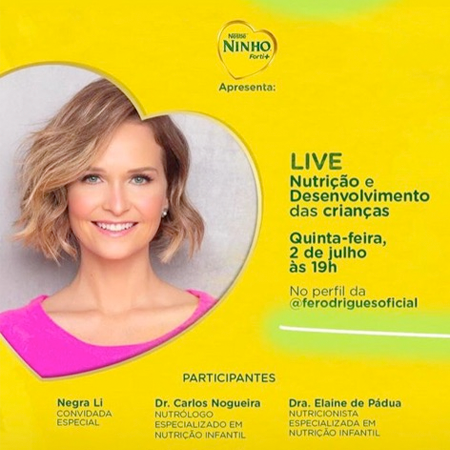
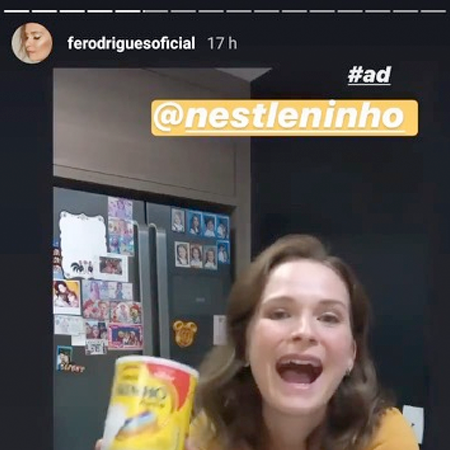
Surveillance was also carried out on the launch of a new infant formula called Nan Supreme with the broadcast of a livestream event with singer Maria Rita. The outcry caused after this stunt by the industry led to the organization of a protest on Twitter to dissuade the artist from taking part in the activity, having reached high levels of participation from members of the Adequate and Healthy Food Alliance (Aliança pela Alimentação Adequada e Saudável), as well as the singer quitting the event. Another Live streaming event caught by the Ibfan radar was one involving the participation of actress Gisele Itiê, called Real Maternity during the Pandemic (“Maternidade Real na Pandemia”), sponsored by food company Danone.

There was also the launch of the Nestlé Young Pediatricians’ Program (Programa Jovens Pediatras - J. Pedia), endorsed by the Brazilian Pediatric Society (SBP), aiming to engage up to 25 thousand Pediatric residents in a Child Nutrition course to be fully held online(1). The residents were given small gifts such as memory sticks (Nestlé miniature pediatricians), notebooks and a pen, in addition to other financial benefits such as the payment of annuities as members of the SPB. These practices are forbidden by the Brazilian Standards for Sales of Infant and Early Childhood Foods, Baby Bottles, Nipples and Pacifiers (NBCAL). In response to this effort, a letter of rejection was sent to the SBP, denouncing the clear conflict of interest of this program, addressed to a number of entities (Brazilian Medical Association, National Health Surveillance Agency, various Health Ministry coordination boards, National Association of Medical Residents, Unicef Brazil, Paho Brazil, International Pediatric Association). It is worth noting that Ibfan Network groups from other countries, such as India, Luxembourg, UK, Costa Rica, also sent letters of rejection to the SBP board.

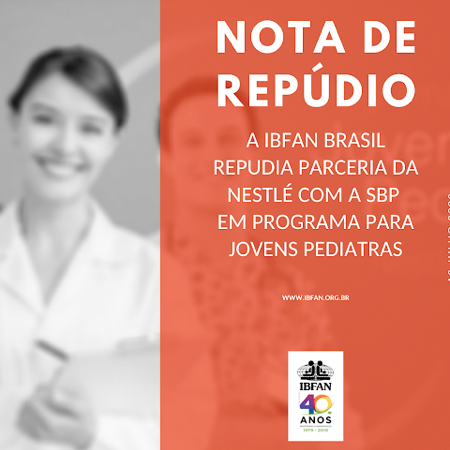
Many digital influencers (celebrities/famous actresses or everyday moms) were also identified during this period, promoting milk powder products on social media, alluding to better quality of sleep for babies resulting from the “chamomile” component added to Ninho Hora de Dormir milk powder, Instagram being the main platform used.
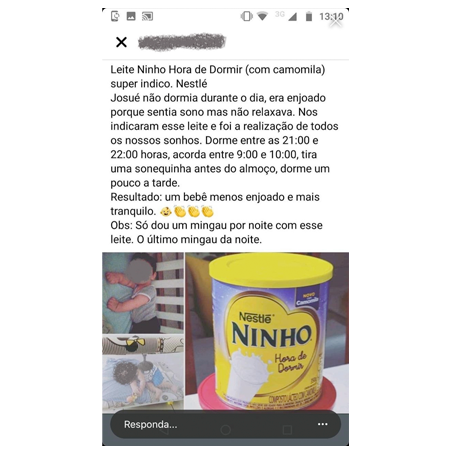
In parallel to all this, as a way of celebrating Golden August and to promote and protect breastfeeding, virtual events and debates were developed by various civil society organizations. As an example, a joint project between the CRN-4 Regional Nutrition Council and the Ibfan Network, in cooperation with the Adequate and Healthy Food Alliance and federal universities from the State of Rio de Janeiro, screened and hosted a debate for the Film “Tigers”, which tells a true story about the abusive and unethical corporate practices used by the industry in order to persuade doctors to prescribe infant formulas. The event remained available for access for the whole of the month of August.
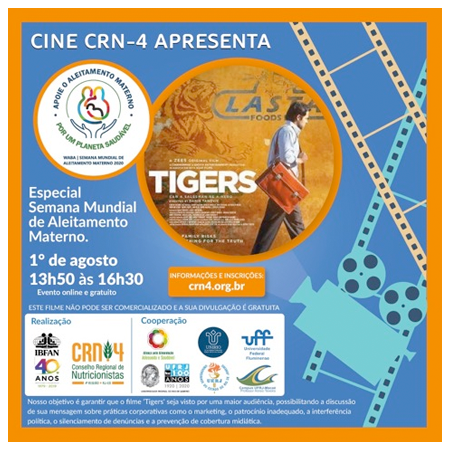
The current scenario we are living in has therefore brought up a few more issues for concern. In the words of Cristina Passos, “in this moment of social distancing brought on by the pandemic, when we are all more focused towards the internet we are also more susceptible to virtual environment advertising and more subject to the influence of this abusive form of marketing”. Regulation of these spaces, furthermore, is still in its very early stages. In addition to that, the nutritionist reminds us that “consumers are in a bigger hurry at the supermarket and tend to buy their products without stopping to read the labels, or alternatively, have their shopping home-delivered, at a greater risk of receiving mistaken products due to similarity in the labels. We have had recent reports from nutritionists who were very surprised by people consuming milk powder, thinking it was milk”.
The point of concern, to her, is in ill-informed choices. “There are families purchasing ultra-processed products without being totally sure of what is being offered to their sons and daughters in early childhood, causing a negative impact on breastfeeding rates, obesity levels and children’s health”, she adds.
More than ever, we need to monitor, report and demand that public authorities fulfill their role in overseeing NBCAL and enforcing public policies geared towards the protection of breastfeeding and Brazilian children, as provided for in the Legal Milestone for Early Childhood(3), for the wellbeing of Brazilian women and families. Also, to monitor and report corporate practices which violate the human right to adequate food, including the rights of our children.
1. By the closing of the edition of the Bulletin, information was obtained that SBP would have given up on granting the affiliation of residents linked to the J. Pedia program. This represents another successful example of pressure from civil society.
2. Law 11.265/2006 and Decree 9.579/2018
3. Federal Law Nº 13.257 /2016.
"Nós" movement: together for the common good or a bunch of companies who want more and more profit?
Laura Cury
The Covid-19 pandemic is leading the global economy towards recession, and industries need to adapt to new and challenging circumstances. Food and beverage companies, including the alcoholic variety, need to weather the storm, and although people continue to consume alcohol, the nature of this consumption is changing. This means that brands need to think beyond traditional tactics when economies start to reopen.
According to sales and marketing specialists, there are three key focus areas which companies should simultaneously consider in order to guarantee the smoothest possible return to business: (1) respond to immediate emergencies and protect the company and consumers; (2) redefine and adapt the business to what will probably be a very different set of employee, client and consumer priorities, taking into account the connection between consumers and their communities; (3) renew and size operations in order to provide support to a resilient business model and help drive the return to growth.
Apparently and possibly taking these criteria into account, a partnership was formed which intially may seem somewhat unusual, but after a bit more careful analysis, makes perfect strategic sense. We are talking about Movimento Nós, (“We” movement), a coalition formed by eight major companies within the food and beverage sector: Ambev, Aurora Alimentos, BRF, Coca-Cola Brazil, Heineken Group, Mondelez International, Nestlé and PepsiCo. The alleged intention is to support small retailers when business starts to reopen. It is worth noting that according to a report on alcoholic beverage consumption in Latin America and the Caribbean, in many countries of the region most sales are accounted for by small retailers. In Brazil, 55% of sales in the beer segment, for example, take place in bars and restaurants, which are closed down due to the quarantine. With current partial reopening and flexibilization of rules, it is time for companies to take action and start “chasing their losses”, as they say in Brazil.
The strategy of joining forces among competing sectors, especially in moments of crisis, has long been applied by the tobacco industry, a pioneer in so many promotion strategies for harmful products later adopted by companies from other sectors, which also run up against health hazard issues. Throughout the history of the tobacco industry, businessmen have been improving their liasons in order to defend the sector and influence various stakeholders, such as media, trade and industrial associations, parliaments, executive branch technical divisions, among others.
The union of various companies in Movimento Nós indicates the possibility of a monopoly being formed, a perfect situation for product supply domination. The Economic Defense Administrative Council (Conselho Administrativo de Defesa Econômica - Cade), however, authorized the collaboration stating that there is plausible economic justification for the agreement, that the parties involved adopted anti-trust risk prevention protocols, that there is no evidence of attempted anti-competitive practises and that the companies have shown concern over competitiveness and normality being restored to the sector. The alliance formed by traditionally rival companies reveals their wide-ranging alluring intent, values conveyed in the movement’s communication through the campaign name and symbolism, using plurals and the infinity symbol, conveying eternal reenactment and repetition, typical of the health-damaging product industry, incidentally. The coalition is a clear response to key area 3, indicated by specialists to deal with the crisis, as previously mentioned.
The investment by the Nós group of over R$ 370 million pledges to support around 300 thousand small businesses throughout Brazil, including bars, snack bars, bakeries, small grocers, trading centers and restaurants, which according to these companies employ around one million people and provide a positive impact on approximately three million lives. Among the actions proposed by the movement, according to a press release sent to the media which can be viewed on the website of the companies involved, are the renegotiation of deadlines for supplying small retailers, as well as the distribution of personal hygiene kits and guidebooks for business owners to follow new health and safety rules. These actions correspond to the responses to key areas 1 and 2.
According to Ambev marketing VP Ricardo Dias, “in these times of crisis the company’s priority, besides keeping our employees safe, is to guarantee the bar and restaurant ecosystem’s return to health as quickly as possible.” Also according to a letter signed by all eight CEOs of the Movimento Nós founding companies, “one cannot think only of individual interests during this moment we are going through with Covid-19: It is time for us to come together and work towards a single goal: to help our nation go through this period with the smallest possible impact. Small retailers are our partners and we must not spare efforts to help them to overcome this crisis.”
Initiatives such as this are frequently described as a way of being part of the solution and can be seen as a form of corporate social responsibility, as we reported in the June edition of the Surveillance Bulletin (Boletim de Monitoramento); a strategy which has been particularly effective within the context of the alcohol industry’s strategic response to the pandemic, positioning itself to be seen as essential, as well as to help the economy and health systems, as shown in the report on Latin America and the Caribbean. In this report, there are statements such as the one given by Heineken Group sustainability manager Ornella Guzzo Vilardo, saying that “people have expectations about the response to be given by companies and what role they will play during times of crisis. Thus, companies with strengthened and consolidated values are able to operate more easily in these periods, providing solutions with greater speed”.
The actions promoted by some of these companies may not be, in actual fact, of such a solidary and responsible nature, at a time when public healthcare specialists in Brazil continue to encourage and guide people to stay at home whenever possible and when science evidences an association between excessive alcohol consumption and adverse immune system effects, which facilitates infection by all types of virus, including coronavirus. This union seems to be more of a partial solution for the eight companies than for retailers and consumers.
Win-win for the tobacco industry at society`s expense
Mariana Pinho e Maria Paula Riva
The pandemic caused by Covid-19 has opened the floodgates to many existing problems within society, and upstaged them. One of them is that the global economy is based on buying and consuming, to the point that the need for social isolation/lockdown has led the world into a recession that may last for years. It has become crucial, therefore, in the midst of such a scenario, that we analyze the driving forces that motivated us to end up in our current situation, both in health as well as market terms.
The most common way to promote consumption of a product is through advertising. It is the most traditional, most usual form, and one which most rapidly translates into increased sales and consequently profits for the companies producing it, especiallly in times of advertising focused and molded according to user practices and profiles.
There are however other ways to increase product sales, such as associating them to socially approved lifestyles, famous figures/characters and/or celebrities, or other businesses which convey business credibility, including philanthropic practices. In dealing with products that are hazardous to health and to the environment, these actions contribute towards distancing the company’s image from the damage caused, also known as reputation-washing and greenwashing.
In the case of the tobacco industry it was no different, even with the mass media advertising ban, in force since 2000 in Brazil. For purposes of self-promotion, therefore, the solution was to reinvent themselves under the guise of corporate social responsibility.
After the World Health Organization warned in March about the link between smoking and the increase in the likelihood of aggravation of the clinical condition and negative outcomes in cases of infection by the virus, shares in the major tobacco companies, Philip Morris International and British American Tobacco, went into freefall on the world’s main stock exchanges. Consequently, social responsibility activities became imperative for these companies, in order to redeem themselves before the market and their consumers. In the following month, the media announced the association between tobacco companies and laboratories obstinately seeking to produce a vaccine against the coronavirus, as in the example of Reynolds American, affiliated to British American Tobacco, owners of Kentucky BioProcessing and Medicago, shareholders in Philip Morris International.
There are many more accounts of corporate responsibility campaigns, as in the case of donations being made by the companies. Philip Morris Brazil declared they had earmarked R$ 3 million and Souza Cruz – a British American Tobacco subsidiary, at least 250 thousand reais. Indeed, it is a very touchy issue to criticize any type of support given to health authorities, who are in dire need of financial, human and logistical resources during this pandemic. This logic, however, should not be applied to the tobacco industry; the price paid for this aid is very high.
Tobacco use costs public coffers over R$ 56 billion per year, considering the costs with tobacco-related diseases, inability to work and premature death. The taxes paid by the sector cover only 23% of this amount. The balance clearly doesn’t add up, and we are the ones who foot the bill.
This deficit gap in public finances is even more outrageous if one considers that part of the resources donated by the tobacco industry constitute tax advances. In other words, the donation benefits a company that kills half of its consumers through tax breaks, and once again, the bill for this shortfall is presented to society.
Additionally, a study published in May this year by the National Cancer Institute pointed out that for each cent invested in marketing by the tobacco industry, the Brazilian government pays out 1.93 that amount on tobacco-related diseases.
All these strategies, apparently, regretfully, have been succesful, and there is nothing left to do but sulk.
During the pandemic, most smokers continue to smoke or have increased the amount of cigarettes per day, a situation verified in several countries. Only 12% of smokers in Brazil have cut down on the amount of cigarettes, while the remainder have maintained or increased consumption throughout the pandemic, according to a survey by Fiocruz and Unicamp.
In the first quarter of 2020, Philip Morris International recorded a 35% growth in net profits if compared to the same period the previous year. In Brazil alone, sales grew by 10.3%. In the following quarter, the company exceeded analysts’ expectations with considerable growth in Earnings Per Share (EPS): the initial forecast was for US$ 1.10 and turned out to be US$ 1.29.
It is high time for the tobacco industry to be made accountable for the harm they have brought on society. It is unacceptable that they continue to profit in detriment of national social and economic development. The good news is that many windows of opportunity are now open.
The first is through the tax reforms, on which ACT has devised a technical paper. In the proposals currently submitted and moving through National Congress there is mention of a specific tax targeted at products that are harmful to health such as alcohol and tobacco. This measure is particularly important, for according to evidence reported in several surveys, tax increases reduce consumption, which in turn leads to the reduction in the number of sickness cases and ends up saving lives.
A second proposal that could be explored, in this case at state level, is the increase in Goods and Services Circulation Tax (ICMS – VAT) and binding this revenue to tobacco use prevention and control campaigns, as per the case in the state of Maranhão.
Lastly, we must not forget to mention a necessary and immediate resolution to the legal proceedings which since 1999 have prevented the National Health Surveillance Agency ( Agência Nacional de Vigilância Sanitária – ANVISA) from receiving amounts generated by cigarette brand registration and renewal, which continue to be deposited in court by Philip Morris and Souza Cruz. In 2020 alone, the Agency failed to collect 30 million reais in revenue for the registration of 150 brands of cigarettes.
It is therefore regrettable that these companies continue to profit in detriment of the death, diseases and financial losses incurred by Brazilian society, not least when faced with the need to deal with the costs of the pandemic. Especially when to that end, they pose as good corporate citizens.

